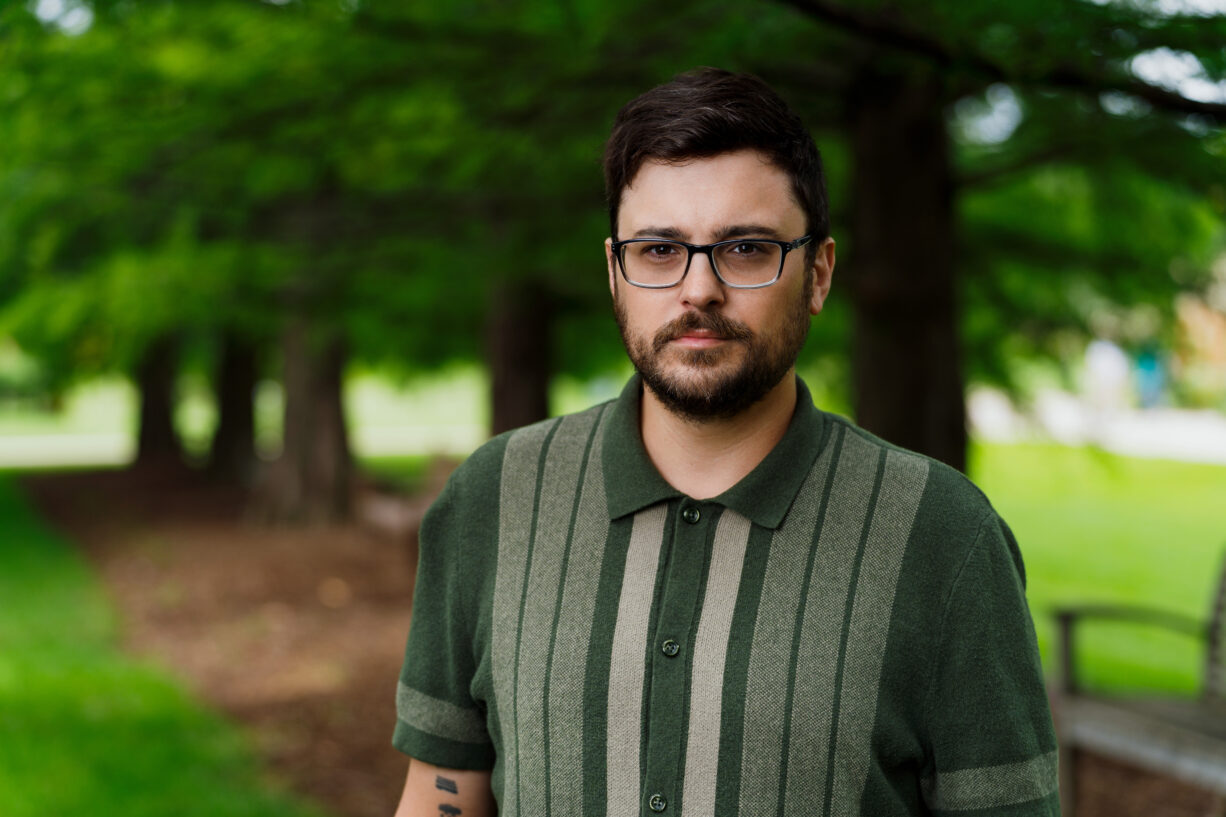
Catching up with 2025 Poetry Prize Winner Samuel Piccone
September 30, 2025 | Awards, blog, Prizes


Samuel Piccone is the author of Domestica (University of Arkansas Press, 2026), winner of the 2025 Miller Williams Prize. His work has appeared or is forthcoming in publications including, Frontier Poetry, Washington Square Review, and RHINO. He serves as poetry editor at Raleigh Review, and is an assistant teaching professor at Iowa State University.
HS: What about Judi Dench’s line from Spaceship Earth inspired you to write this piece?
SP: It’s kind of funny, but the epigraph was probably one of the last things that I added to the poem, and had I not read the script for the ride, it may not have even made it in there at all. But it was the first thing I looked at every time I returned to the script hunting for more ideas, and eventually it just made sense to start the poem with some of the same language that starts the ride itself.
HS: Did you get to experience Spaceship Earth? If so, did the experience itself help shape the poem?
SP: Yes, I was able to ride it on my first trip to Disney, which was only a couple of years ago. And the experience was essential to say the least. As a late thirty-something dad wandering around this immersive theme park experience with a four-year old, a sunburned spouse, and my in-laws, I wasn’t really feeling, “the magic,” I was assured I would feel. But there was something about this ride and its weird, high-tech yet analog version of the future that I just loved. It was ridiculous and poignant at the same time. I went back the next day and rode it twice.
HS: What made you choose the form for this poem?
SP: I don’t know if I’d say I necessarily ever fully choose the form. Mostly, I’m just looking for something that feels right, and in this case (as is often the case for me) a single stanza with longer lines tends to feel pretty good. I think the burden of proof goes up in a poem when the lines are longer—the meaning within each line gets more complex, the momentum of the poem can slow, etc. But that’s always been a fun place for me to write in, to see if I can make one long line work, then the next one, and so on. I think in this case, form and content found each other particularly well: a blocky poem with long lines about a slow, uphill ride through the past. It made sense to me at least.
HS: Were there other titles before “Spaceship Earth?“
SP: Nope, no other titles. When there’s a good title already built into the poem, you take it.
HS: How did you go about melding the past and present in this poem?
SP: I think I have to give a lot of credit to the ride on this one, because that’s kind of what it’s about. You pass through dozens of little scenes throughout history, and at some point in the middle of each one there’s a little staring contest between you and an animatronic version of who you could have been back then. All I really did was start looking around to see if the other people on the ride were in the same staring contests I was. When I found they were, I just started watching them.
HS: Were there any poems or specific authors that helped influence your poem?
SP: Most definitely. When I went back to see what I was reading around the time I went to Disney, a couple of books stood out like sore thumbs. The World Keeps Ending, and the World Goes On by Franny Choi and Information Desk by Robyn Schiff. Their fingerprints are all over my poem in terms of scope, subject matter, the way each book explores human experience and history, I could go on and on. Very lucky that those texts found me when they did.
HS: What does your revision process look like?
SP: I don’t know if it’s really anything all that special. I typically start with a block of messy prose and just start trimming stuff away. I’m always looking for interesting leaps from one idea to the next and falling on my face many times before I get the landings right. At some point I start testing forms until one feels like the right container. Eventually I over-revise the poem because I’m lousy at breaking bad habits, but thankfully I’ve learned how to walk things back a step or two, slap my name on the thing and call it good.
HS: What do you wish for readers to take away from this poem and what does this poem mean to you?
SP: For readers, I hope they take away anything, even if it isn’t what I intended or expected. One thing I’ve always liked about writing/creating art in general is that once it’s out of my hands, the people who find it get to tell me what the piece is about. Usually, it’s better than what I had intended.
For me, this poem is simply a good photo from a family vacation. One I’m very grateful to have captured.
Submissions for the swamp pink Poetry Prize open on January 1st and will close January 31st.
Submit your work here.
With a $20 entry fee, writers may submit up to 1-3 poems. Winners receive $2,000 and publication. All entries will be considered for publication.
Before you submit, please remove your name and any other identifying information from your manuscript. Simultaneous submissions are okay, as long as you contact us should the work be accepted elsewhere.
